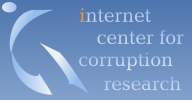
| Home → Corruption Perceptions Index → 2006 → Press Release |  |
| Home | |||
| Contact information | |||
| Research Area | |||
| Corruption Perceptions Index | |||
| 2009 and later | 2008 | 2007 | |
| 2006 | |||
| 2005 | |||
| 2004 | |||
| 2003 | |||
| 2002 | |||
| 2001 | |||
| 2000 | |||
| older indices | |||
| childhood days | |||
| Lecture and Workshops |
New Index Highlights Failures in the Fight Against Corruption
The University of Passau compiles the 12th Corruption Perceptions Index (CPI) on behalf of Transparency International (TI).
Passau University, 6 November 2006: The new CPI index is out today, coming with unpleasant news for many countries whose leaders will have to stand intense scrutiny and interrogation.
163 countries are ranked according to the extent of corruption as judged by international businesspeople and experts in this year's Corruption Perceptions Index. For many of these countries corruption remains the core obstacle to economic and social development, inducing widespread poverty and inequality. 119 countries in the index obtain a score of less than 5 on a scale from 0 (high corruption) to 10 (clean). As widely evidenced in empirical investigations, these are the countries where corruption severely hinders prosperity, barring the poor from access to basic goods and disallowing the powerless to raise their concern. These are the countries where people are victimized by the corruption of powerful individuals and where leaders and institutions fail to serve the public.
One prominent example of the distorting effects of corruption relates to health care and education. Child and infant mortality rates are double as high in corrupt countries; doctors take bribes from those who can little afford them; schools remain underfinanced because corrupt policymakers prefer to waste resources on white-elephant projects. It is thus the poor who pay double the price: their taxes are embezzled and badly paid teachers and doctors demand bribes in exchange for what they should provide for free. These are the dreadful realities that are behind the figures published today.
Here is the bad news. The following countries have deteriorated in the CPI as compared to last year, representing a perceived trend to increased corruption: Brazil, Cuba, Israel, Jordan, Laos, Seychelles, Trinidad and Tobago, Tunisia and USA. This list embraces low income as well as high income countries, where the dismal effects tend to be less visible.
Also worrying is the result for Iraq. After scoring 2.2 in 2005, the value dropped to 1.9 this year and the country now ranks second to last. The three sources that contribute to the assessment of Iraq have not revised their extremely bad ranking this year, but an older source from 2003 that provided a less dismal score, relating to the situation prior to invasion, has dropped from the CPI. The overall assessment must be seen against experts' viewpoints collected in the beginning of the 1980s. These rated Iraq at that time to be largely free of corruption. The utter grand corruption under Saddam Hussein has severely hurt the country afterwards. Since then, instead of ameliorating the problem, corruption has further escalated. Pre-invasion promises to ease the citizen's burden were not accomplished.
Another war-torn country, Afghanistan, is no longer in the CPI because of insufficient information. The 30 million people of this country are no longer on the map of international investors. This is depressing news, revealing how uninviting the country has become to businesspeople.
Here is the good news. Finland, Iceland and New Zealand share the top score, providing a good precedent that corruption can be almost eradicated. Even poorer countries such as Chile, Barbados, Uruguay, Jordan and Botswana score rather well, revealing that the downward spiral of poverty and corruption can be overcome.
Countries competing for integrity can improve their ranking in the CPI. Between 2005 and 2006 improvements were recorded in Algeria, Czech Republic, India, Japan, Latvia, Lebanon, Mauritius, Paraguay, Slovenia, Turkey, Turkmenistan and Uruguay. Such variations from one year to another may not yet depict a sustainable development. When investigating data between 1995 and 2006, we observe significant improvements in Austria, Bulgaria, Colombia, El Salvador, Estonia, Hong Kong, Iceland, Latvia and Spain. These are the places to look at when seeking good precedent.
Corruption is not the same everywhere. Research has been carried out to determine whether bribes are more common to lower level public servants or to high ranking politicians. In the following countries, it is rather the lower level public servants that are perceived to be corrupt: Bangladesh, Cambodia, Cameroon, Egypt, Greece, Mali, Mongolia, Romania, Tajikistan, Tanzania and Vietnam. To the contrary, grand corruption by senior politicians is regarded to be at the core of the problem in Cyprus, France, Iceland, Italy, Mauritania, Mauritius, Namibia, Taiwan and Zambia. The leaders of these countries must know that anti-corruption is less a question of political campaigning but of cleaning their own house.
Details of Transparency International's Corruption Perceptions Index 2006 are available at: http://www.transparency.org/policy_research/surveys_indices/cpi and at www.ICGG.org.
Johann Graf Lambsdorff holds a chair position in economic theory at the University of Passau (Germany). He is an authority in corruption and anti-corruption, combining academic rigor with a sharp analytical sense for real-life problems and solutions. Since 1995 he has been senior research consultant to Transparency International. As the 'father' of the TI Corruption Perceptions Index, which he orchestrates since 1995, Johann Graf Lambsdorff is one of the world's most prominent figures in qualitative research on corruption with publications in leading international journals. By linking the world of reform with state-of-the-art research it develops innovative concepts beyond the popular "more-control" paradigm.